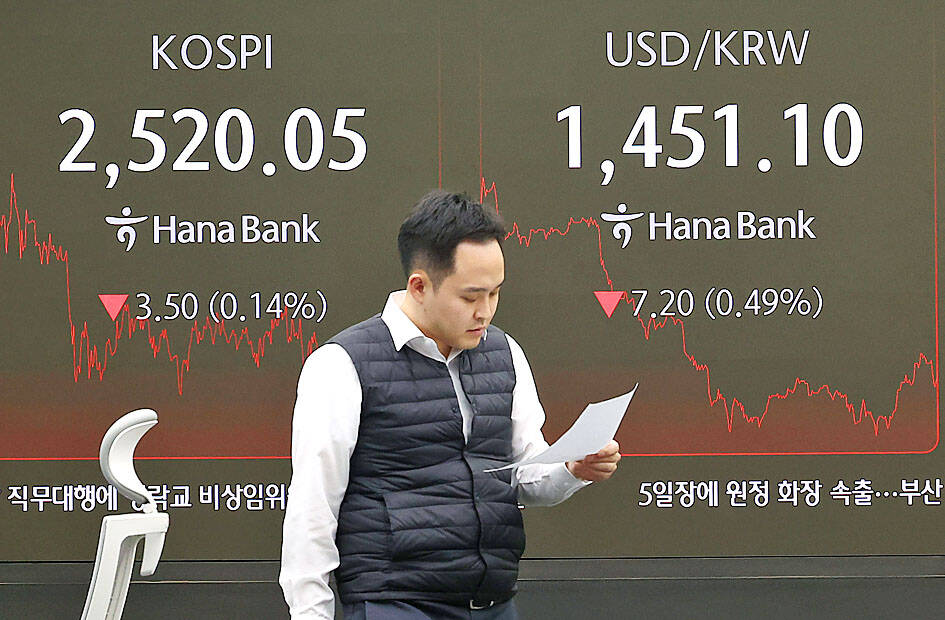South Korea’s central bank yesterday slashed its growth forecast for this year because of the political crisis triggered by South Korean President Yoon Suk-yeol’s declaration of martial law last month.
The move came as the government unveiled a US$250 billion support package for exporters amid worries of possible tariffs by US President Donald Trump as he returns to the White House.
“The unexpected declaration of martial law in early December, coupled with the ongoing political turmoil and the Jeju Air passenger plane disaster, significantly dampened economic sentiment,” the Bank of Korea said in a statement.

Photo: EPA-EFE
The political turmoil and plane crash “led to contractions in domestic consumption and construction investment, likely causing the fourth-quarter growth rate to fall well below the November projection,” the statement said. “Consumption, which had shown improvement in the third quarter, appeared to weaken again in the fourth quarter.”
As a result, the bank’s Monetary Policy Committee revised down its estimate for the final quarter of last year, from 2.2 percent to a range of 2.0 to 2.1 percent.
It had projected 1.9 percent growth for this year, but “the forecast has been revised downward to 1.6 to 1.7 percent,” it said.
Hours after the central bank slashed its growth forecasts, the South Korean Ministry of Finance announced a huge exporter support package in preparation for possible tariffs by Trump.
The ministry said it was allocating massive new support for the nation’s exporters, including technology giant Samsung Electronics Co and semiconductor leader SK Hynix Inc, owing to growing risks overseas.
“External uncertainties, such as the inauguration of the new US administration, pose concerns about potential adverse effects on the export front for businesses,” ministry Support Division Deputy Director Kim Dong-joon said.
In response, “the government plans to provide export financing on an unprecedented scale of 360 trillion won [US$248.1 billion] this year,” the ministry said in a statement.
In part due to the protracted political chaos, the won has fallen to record lows against the US dollar.
The ministry said that to mitigate the foreign exchange rate volatility, it would boost the budget for exchange rate fluctuation insurance.
The package includes allowing the Export-Import Bank of Korea to provide 50 trillion won over the next five years to industries such as semiconductors and batteries, “which have recently faced challenges,” the statement said.
Kim said that the government would try “to develop financial support measures to help promising industries — such as defense, nuclear energy and shipbuilding — leverage US-Korea cooperation to expand export and contract achievements.”
The benchmark KOSPI fell 0.14 percent to close at 2,520.05 after the central bank cut its growth forecasts, while the won was trading at 1,451.7 per US dollar at 3:30pm, down 6.6 won from the previous session.

SEMICONDUCTORS: The German laser and plasma generator company will expand its local services as its specialized offerings support Taiwan’s semiconductor industries Trumpf SE + Co KG, a global leader in supplying laser technology and plasma generators used in chip production, is expanding its investments in Taiwan in an effort to deeply integrate into the global semiconductor supply chain in the pursuit of growth. The company, headquartered in Ditzingen, Germany, has invested significantly in a newly inaugurated regional technical center for plasma generators in Taoyuan, its latest expansion in Taiwan after being engaged in various industries for more than 25 years. The center, the first of its kind Trumpf built outside Germany, aims to serve customers from Taiwan, Japan, Southeast Asia and South Korea,

Gasoline and diesel prices at domestic fuel stations are to fall NT$0.2 per liter this week, down for a second consecutive week, CPC Corp, Taiwan (台灣中油) and Formosa Petrochemical Corp (台塑石化) announced yesterday. Effective today, gasoline prices at CPC and Formosa stations are to drop to NT$26.4, NT$27.9 and NT$29.9 per liter for 92, 95 and 98-octane unleaded gasoline respectively, the companies said in separate statements. The price of premium diesel is to fall to NT$24.8 per liter at CPC stations and NT$24.6 at Formosa pumps, they said. The price adjustments came even as international crude oil prices rose last week, as traders

Taiwan Semiconductor Manufacturing Co (TSMC, 台積電), which supplies advanced chips to Nvidia Corp and Apple Inc, yesterday reported NT$1.046 trillion (US$33.1 billion) in revenue for last quarter, driven by constantly strong demand for artificial intelligence (AI) chips, falling in the upper end of its forecast. Based on TSMC’s financial guidance, revenue would expand about 22 percent sequentially to the range from US$32.2 billion to US$33.4 billion during the final quarter of 2024, it told investors in October last year. Last year in total, revenue jumped 31.61 percent to NT$3.81 trillion, compared with NT$2.89 trillion generated in the year before, according to

PRECEDENTED TIMES: In news that surely does not shock, AI and tech exports drove a banner for exports last year as Taiwan’s economic growth experienced a flood tide Taiwan’s exports delivered a blockbuster finish to last year with last month’s shipments rising at the second-highest pace on record as demand for artificial intelligence (AI) hardware and advanced computing remained strong, the Ministry of Finance said yesterday. Exports surged 43.4 percent from a year earlier to US$62.48 billion last month, extending growth to 26 consecutive months. Imports climbed 14.9 percent to US$43.04 billion, the second-highest monthly level historically, resulting in a trade surplus of US$19.43 billion — more than double that of the year before. Department of Statistics Director-General Beatrice Tsai (蔡美娜) described the performance as “surprisingly outstanding,” forecasting export growth